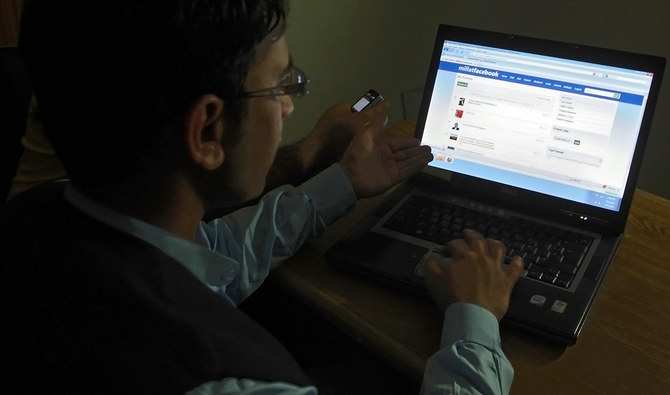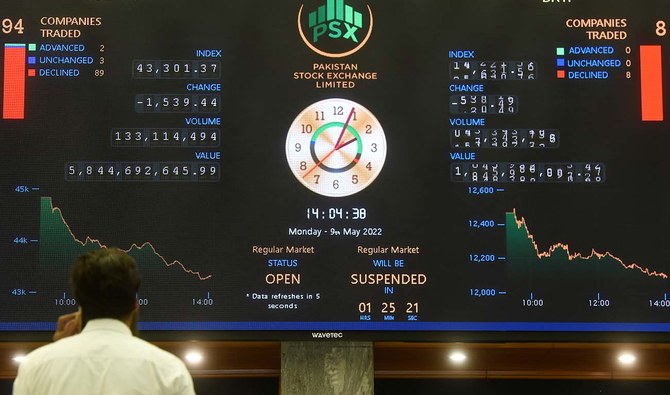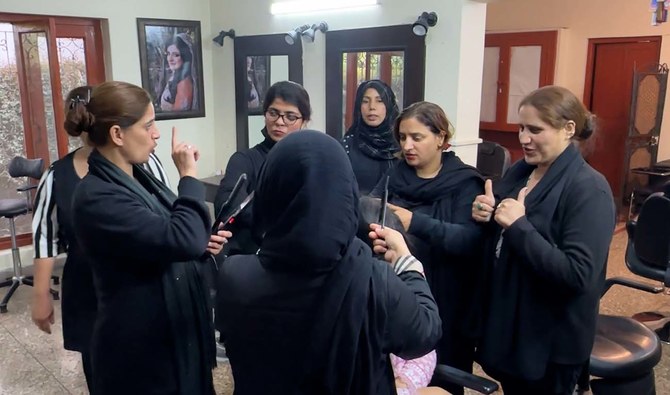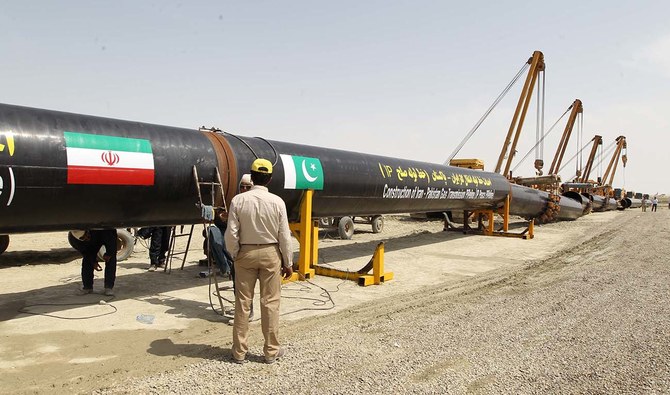ISLAMABAD: Pakistan has introduced new social media rules to make digital networks and internet service providers block and remove “unlawful online content” or face shutdown in case of non-compliance, making digital rights activists claim the measure has been taken to curb freedom of expression in the country.
Under the rules notified on Wednesday, social media companies are bound to block access to unlawful online content within twenty-four hours — or in emergency cases, within six hours — after being reported by a government authority.
If a social media company or internet service provider fails to abide by the rules, “the authority may issue directions for blocking of the entire online system or any services provided by such service providers or social media company,” reads the 13-page document.
Islamabad has been struggling to regulate online content by blocking and removing fake news and propaganda against the country’s national security institutions, including the army, blasphemous content, and other sensitive material that violates cultural and ethnic norms of the country. So far, the authorities have fully received cooperation from social media companies in the absence of local rules that regulate these networking platforms.
“The purpose of these rules is to ensure effective implementation of local laws through quick removal of unlawful, defamatory, obscene and pornographic content from social media platforms,” Khurram Ali Mehran, a spokesman for the Pakistan Telecommunication Authority, told Arab News.
He said the rules were framed in compliance with the Prevention of Electronic Crimes Act that was passed by parliament in 2016. “We are asking social media companies to open their offices in Pakistan to address genuine complaints of our users as per the law,” he said.
The government issued almost similar social media rules earlier in February, but later withdrew them after protests from digital rights activists and social media giants.
Under the rules, the social media companies and internet service providers with more than half a million users in Pakistan are required to register with the authority, establish a permanent office in Islamabad, and appoint a focal person based in the country within nine months and within three months, respectively, of coming into force of these rules.
The rules also suggest that the companies will be bound to establish one or more database servers in Pakistan within eighteen months of coming into force of these rules to store data and online content, but it is subject to the promulgation of data protection law.
“This is just to give the impression that there is a legal cover for this [blocking the online dissent and freedom of expression], but how legal this is and how constitutional this is, is up for challenge,” Farieha Aziz, a digital rights activist who heads Bolo Bhi, told Arab News.
She said the government was shrouding it all with the provision of a complaint mechanism to address grievances, but that was not enough to deal with the important issue. “Journalists and activists have a lot to lose out because social media is now their only other avenue [to express themselves],” Aziz said.
Any person aggrieved by any order or direction of the authority under the rules may file a review application within thirty days from the date of the passing of the order, and it will be decided within thirty working days. An appeal against the authority’s order can also be filed in a high court within thirty days of the order of the authority.
The rules allow any individual, government department, including a law enforcement or intelligence agency, to file a complaint against any unlawful online content with reasons for its removal or blocking access on digital platforms.
The rules have also brought internet services providers on a par with the social media companies and all the requirements have been applied to them as well, which they have termed unnecessary and in violation of the country’s cyber laws.
“We neither have capability nor the resources to monitor our traffic and identify those indulging in any unlawful online activity,” Wahaj-us-Siraj, convener of the Internet Services Providers Association of Pakistan, told Arab News.
“The government has unnecessarily dragged us into it,” he said. “This will make our business difficult, and provide the government with a tool to twist telecom operators’ arm.”
Pakistan introduces social media rules to block access to ‘unlawful’ online content
https://arab.news/6be3g
Pakistan introduces social media rules to block access to ‘unlawful’ online content

- Social networking websites are required to remove unlawful content in 24 hours after receiving a government directive
- Digital rights activists and telecom operators term the rules illegal and an attempt to curb freedom of expression in the country
Babar hoping paceman Rauf will regain full fitness and make an impact for Pakistan at T20 World Cup

- Fast bowler Rauf has been included in an 18-man squad for the upcoming tours of Ireland and England
- Pakistan has done well in last two T20 World Cups, reaching semifinals in 2021, final at 2022 tournament
ISLAMABAD: Pakistan captain Babar Azam is hoping Haris Rauf will regain full fitness after a shoulder injury and make an impact at next month’s T20 World Cup.
Fast bowler Rauf has been included in an 18-man squad for the upcoming tours of Ireland and England, with Pakistan delaying its 15-strong party for the World Cup in the United States and West Indies until May 22.
The fitness of Rauf, Mohammad Rizwan, Irfan Khan and Azam Khan will be assessed during the seven T20s against Ireland and England.
“I wasn’t expecting that he (Rauf) would recover so early and start bowling again,” Babar told reporters in Lahore on Monday as the team prepared to fly out to Ireland, where the first T20 will be played in Dublin on Friday.
“There’s pressure on him to make a comeback. There’s lot of talk going around on his injury and how he will respond to it. But I think he will make a good response because when you give yourself proper rest mentally and physically, you can make a different impact.”
Rauf has been out since dislocating his shoulder in late February during the Pakistan Super League. Since then he has gone through rehabilitation at the National Cricket Academy in Lahore.
The seven-member selection committee, which also includes Babar, have named fast bowler Hasan Ali, who last played a T20 international in 2022, as backup for Rauf.
Babar backed the inclusion of Hasan after pace bowlers Zaman Khan, Mohammad Wasim and the PSL’s top wicket-taker Mohammad Ali were omitted.
“There’s no injustice with anyone. We debated a lot on the World Cup combination and Hasan is there as backup for Rauf because of his experience,” Babar said. “Zaman and Ali are new-ball bowlers but we already have enough new-ball bowling options.”
Fast bowler Mohammad Amir, who played in two T20s against New Zealand after ending his retirement, Shaheen Shah Afridi, Naseem Shah and Abbas Afridi are Pakistan’s pace options.
Under Babar, Pakistan has done well in the last two T20 World Cups, reaching the semifinals in 2021 at the United Arab Emirates and losing to England in the final at the 2022 tournament in Australia.
The chairman of the Pakistan Cricket Board, Mohsin Naqvi, has promised a cash award of $100,000 to every player if the team wins the tournament.
“What happened in the past is in the past, unfortunately we couldn’t finish the way we wanted,” Babar said. “We’re doubly confident and believe we can bring the trophy home.”
Pakistan starts its campaign against host United States in Dallas on June 6 before taking on arch-rival India in New York three days later.
White-ball head coach Gary Kirsten will likely join the team in England after completing his Indian Premier League assignment with Gujarat Titans.
Pakistan stocks continue to rally on Saudi investment optimism, decline in inflation

- A 50-member delegation led by Saudi Arabia’s Assistant Minister of Investment Ibrahim Al-Mubarak arrived in Pakistan on Sunday
- Pakistan and Saudi Arabia have seen a flurry of bilateral visits in recent weeks that have fueled hopes of investment in South Asian country
KARACHI: Pakistan’s benchmark share index closed at another all-time high by registering a 1.2 percent gain as bulls celebrated the arrival of a high-level investment delegation from Saudi Arabia, analysts said on Monday.
The KSE-100 index witnessed a bullish trend, gaining an intraday high of 1,158.65 points that marked a 1.61 percent increase. It closed at 72,764.24 points, up by 1.20 percent.
Stock analysts said the major contributing factor behind the bullish close was the arrival of a 50-member Saudi business delegation in Pakistan for potential investments and a drop in inflation.
“Today’s all the bullish activity was because of the Saudi delegation visiting Pakistan to explore investment opportunities,” Sheheryar Butt, portfolio manager at Darson Securities, told Arab News.
The delegation, led by Saudi Arabia’s Assistant Minister of Investment Ibrahim Al-Mubarak, arrived in Pakistan on Sunday. It comprises representatives of some 30 Saudi companies from the fields of IT, telecom, energy, aviation, construction, mining exploration, agriculture and human resource development.
Butt said the encouraging remarks by the visiting Saudi investment minister on Monday also played a key role in keeping the market in the green zone.
Addressing an investment summit in Islamabad, the Saudi minister said Pakistan was a “high priority” economic opportunity and the Kingdom believed in the potential of Pakistan’s economy, demographics and talent as well as location and natural resources.
Speaking at the summit, Pakistan Finance Minister Muhammad Aurangzeb said foreign investment was vital to macroeconomic stability in Pakistan and the visit of Saudi investors was a link in this chain.
Auzrangzeb said Prime Minister Shehbaz Sharif’s successful visit to Saudi Arabia opened the way for economic cooperation between the two countries.
“The visit of a delegation of Saudi investors to Pakistan is also a part of paving the way for this economic cooperation,” the minister said. “The government is now moving toward privatization and PIA [Pakistan International Airlines] will also be privatized.”
He said export-led growth, foreign direct investment (FDI) and excess to capital were top priorities of the government, and it was working on short, medium and long-term strategies as well as structural economic reforms.
Ali Nawaz, CEO of Chase Securities, attributed the bullish trend at the stock market to the arrival of the Saudi investment delegation.
“This news likely injected optimism into the market as it suggests potential for increased foreign investment, bolstering investor confidence,” Nawaz said.
Other factors, he said, included a decline in inflation that fueled a positive sentiment.
“Lower inflation rates typically indicate a healthier economic environment, fostering expectations of potential interest rate cuts in the future,” he added.
Pakistan stocks continue to rally on Saudi investment optimism, decline in inflation

- A 50-member delegation led by Saudi Arabia’s Assistant Minister of Investment Ibrahim Al-Mubarak arrived in Pakistan on Sunday
- Pakistan and Saudi Arabia have seen a flurry of bilateral visits in recent weeks that have fueled hopes of investment in South Asian country
KARACHI: Pakistan’s benchmark share index closed at another all-time high by registering a 1.2 percent gain as bulls celebrated the arrival of a high-level investment delegation from Saudi Arabia, analysts said on Monday.
The KSE-100 index witnessed a bullish trend, gaining an intraday high of 1,158.65 points that marked a 1.61 percent increase. It closed at 72,764.24 points, up by 1.20 percent.
Stock analysts said the major contributing factor behind the bullish close was the arrival of a 50-member Saudi business delegation in Pakistan for potential investments and a drop in inflation.
“Today’s all the bullish activity was because of the Saudi delegation visiting Pakistan to explore investment opportunities,” Sheheryar Butt, portfolio manager at Darson Securities, told Arab News.
The delegation, led by Saudi Arabia’s Assistant Minister of Investment Ibrahim Al-Mubarak, arrived in Pakistan on Sunday. It comprises representatives of some 30 Saudi companies from the fields of IT, telecom, energy, aviation, construction, mining exploration, agriculture and human resource development.
Butt said the encouraging remarks by the visiting Saudi investment minister on Monday also played a key role in keeping the market in the green zone.
Addressing an investment summit in Islamabad, the Saudi minister said Pakistan was a “high priority” economic opportunity and the Kingdom believed in the potential of Pakistan’s economy, demographics and talent as well as location and natural resources.
Speaking at the summit, Pakistan Finance Minister Muhammad Aurangzeb said foreign investment was vital to macroeconomic stability in Pakistan and the visit of Saudi investors was a link in this chain.
Auzrangzeb said Prime Minister Shehbaz Sharif’s successful visit to Saudi Arabia opened the way for economic cooperation between the two countries.
“The visit of a delegation of Saudi investors to Pakistan is also a part of paving the way for this economic cooperation,” the minister said. “The government is now moving toward privatization and PIA [Pakistan International Airlines] will also be privatized.”
He said export-led growth, foreign direct investment (FDI) and excess to capital were top priorities of the government, and it was working on short, medium and long-term strategies as well as structural economic reforms.
Ali Nawaz, CEO of Chase Securities, attributed the bullish trend at the stock market to the arrival of the Saudi investment delegation.
“This news likely injected optimism into the market as it suggests potential for increased foreign investment, bolstering investor confidence,” Nawaz said.
Other factors, he said, included a decline in inflation that fueled a positive sentiment.
“Lower inflation rates typically indicate a healthier economic environment, fostering expectations of potential interest rate cuts in the future,” he added.
Pakistan’s deaf-staffed beauty salon provides economic opportunity, empowers hearing impaired

- There are seven deaf beauticians out of a total of 12 employed at Options Salon in Abbottabad
- According to the World Health Organization, deaf population in Pakistan is around 10 million people
ABBOTTABAD: Eight years ago, while offering a training class at her Options beauty salon in the northwestern Pakistani city of Abbottabad, Nighat Aftab received an unlikely application: that from a deaf girl who wanted to attend the training and join her salon.
“I didn’t have much experience working with such women and at first, I hesitated a little that how could I hire such a person whose language I don’t understand?” Aftab told Arab News in an interview earlier this month. “But then I said, ‘Come, join me’.”
Today, there are seven deaf beauticians out of a total of 12 employed at Options, which has since become a sanctuary for women with hearing and speech impairments, providing them economic opportunity, a chance to be financially independent and earn for their families, and a place where they can be part of a supportive, inclusive community.
According to the World Health Organization, the deaf population in Pakistan is around 10 million people. Pakistan has one of the lowest percentages of female labor force participation in South Asia and women with disabilities face even more impediments to employment.
“Previously, I used to work at a parlor in Islamabad where my salary wasn’t great, and I used to miss home a lot,” beautician Saima Mir told Arab News in sign language as Aftab translated for her.
“Now I am very happy. I like working here. There are many here who cannot hear and speak, it makes me happy.”
Others also said they felt a “sense of belonging” at the Options Salon.
“I have my mother and father. They are old. I feel frustrated at home as there is nobody with whom I can talk and share,” Isma Mushtaq told Arab News. “I come here and I spend time here happily.”
While many of the salon’s loyal customers are now used to communicating with the deaf staff members, that was not always the case, Aftab recalled, saying she faced criticism in the beginning by clients struggling to communicate with her workers. To bridge the gap, deaf workers were teamed up with those from the hearing community.
“The difficulties we faced [with communication] in the beginning got resolved over time,” said Sobia Khan, a beautician from the hearing community.
And the troubles had been worth it, Aftab said.
“I might have closed down the salon by now because my daughters are now married and I want to enjoy my own life but I am committed because of these young women [deaf workers] and I am unable to quit because their employment is attached to me,” she said.
“And because of them, Allah has blessed me with health. I am able to come to work daily, even though I am not that healthy, but I am happy here.”
Iran, Pakistan seek ways to complete gas pipeline project

- Both countries signed agreement to construct the pipeline from Iran’s South Fars gas field to Pakistan’s Balochistan, Sindh
- Tehran says has invested $2 bln to construct pipeline, but work on Pakistan side has been held up due to fears of US sanctions
KARACHI: Iran and Pakistan are looking at ways to complete a long-delayed gas pipeline project between the two countries, Iran’s Consul General to Pakistan, Hassan Nourian, said on Monday.
“We see political determination from Pakistan to complete the project,” he told reporters in the southern city of Karachi.
The countries signed an agreement to construct the pipeline from Iran’s South Fars gas field to Pakistan’s Balochistan and Sindh provinces in 2010, but work on Pakistan’s portion has been held up due to fears of US sanctions.
The 1,900 kilometer (1,180 mile) pipeline was meant to supply 750 million to one billion cubic feet per day of natural gas for 25 years to meet Pakistan’s rising energy needs.
Tehran says it has invested $2 billion to construct the pipeline on its territory. Pakistan, however, did not begin construction, citing international sanctions on Iran as the reason.
In 2014, Islamabad asked for a 10-year extension to build the pipeline, which expires in September this year. Iran can take Pakistan to international court, industry watchers have said.
Faced with potential legal action, Pakistan’s caretaker administration this year gave the go ahead in principal to commence plans to build an 80km segment of the pipeline.
In March, Islamabad said it would seek a US sanctions waiver for the pipeline. The US, however, said it did not support the project and cautioned about the risk of sanctions in doing business with Tehran.
Nourian on Monday said the pipeline did not come under international restrictions, and that the two countries were discussing the issue.
He did not answer a question about the potential for Iran to take legal action against Pakistan if it did not complete its side of the pipeline this year.
Pakistan, whose domestic and industrial users rely on natural gas for heating and energy needs, is in dire need for cheap gas with its own reserves dwindling fast and LNG deals making supplies expensive amidst high inflation.
Iran has the world’s second-largest gas reserves after Russia, according to BP’s Statistical Review of World Energy, but sanctions by the West, political turmoil and construction delays have slowed its development as an exporter.










